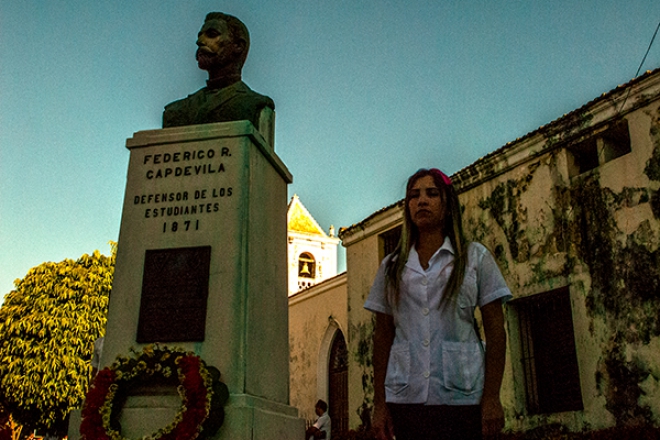 Not for being repeated every year, the condemnation of the university students of this province of eastern Cuba to the shooting of eight medical students by the Spanish colonialists on November 27, 1871, ceased to be blunt.
Not for being repeated every year, the condemnation of the university students of this province of eastern Cuba to the shooting of eight medical students by the Spanish colonialists on November 27, 1871, ceased to be blunt.
Las Tunas.- "The horrendous crime can never be forgotten," said Eduardo Antonio Rondón Martínez, president of the University Student Federation (FEU) at the local Medical University, addressing the crowd of young people who filled the corner of the Vicente García Park where it was erected a monument to Federico Capdevilla, a Spanish officer that appealing to his honor assumed the defense of those who died prey to the hatred of the Iberian fundamentalists, 148 years ago.
"This fact led to and continues to foster world revulsion and reaffirm the independence sentiments of Cubans," said Rondón Martínez during the meeting that was chaired by Juan Carlos Oliver González, member of the Executive Bureau of the Provincial Committee of the Cuban Communist Party, and Anier Arnedo Sánchez, first secretary of the Provincial Committee of the Young Communist Union (UJC).
The day of remembrance for the 148 anniversary of those events was completed with the screening, at the Tunas Theater, of the film Inocencia (Innocence) by Cuban director Alejandro Gil. The feature film inspired by the history of the medical students won the special prize at the 40th International Festival of the New Latin American Cinema, and its director won an award at the 20th edition of the Havana Film Festival in New York.
On November 27th, 187, Anacleto Bermúdez and González, Alonso Álvarez de la Campa, Pascual Rodríguez y Pérez, Carlos Augusto de Latorre, Ángel Laborde, Carlos Verdugo, Eladio González and Toledo, and José de Marcos and Medina, students of the first medical course in Havana, were shot by the Volunteer Corps under spurious accusations of having desecrated the tomb of the Spanish journalist Gonzalo Castañón. The process of detention, trial, and execution of the sentence only took three days in a climate of deep anti-Cuban hysteria that prevailed in the capital of the then colony.